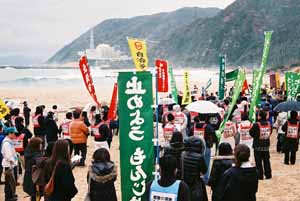Monju’s Never Ending Problems Nuke Info Tokyo No. 140
 |
|
Photo: On the beach facing Monju
|
On December 4, about 1,000 people gathered in Tsuruga City for a public meeting and demonstration to demand the closure of the Monju Prototype Fast Breeder Reactor (FBR, 280MWe). Demonstrations have been held at this time each year since the first anniversary of the December 8, 1995 accident at Monju, which involved a sodium leak and fire. The public meeting was hosted by six local groups, including Fukui Prefecture Citizens Against Nuclear Power and Citizens’ Nuclear Information Center.
The last edition of Nuke Info Tokyo discussed the failure of attempts to remove a 3-ton fuel relay device that is stuck in the reactor (NIT 139). On December 16 Monju’s owner-operator, Japan Atomic Energy Agency (JAEA), announced a plan to remove the relay device together with the sleeve on which it is caught. JAEA says it will design a new item of equipment and attach it to the top of the relay device. There is all sorts of machinery in the reactor head, including the control rod drive mechanism, so undoubtedly the design, manufacture and installation of the new equipment will be very complicated. The process will be particularly difficult, because the reactor contains molten sodium, heated to over 200oC, which would cause a fierce fire if it came into contact with air.
The next stage in the Monju tests is to start raising power output to 40%. This was scheduled to begin in June this year, but JAEA announced that because of the problems with the fuel relay device it is now aiming to commence the next stage by March 2011.
There have also been several other problems at Monju recently. On December 27 an operational error at Monju caused a drop in voltage in Hokuriku Electric Power Company’s power transmission system. It was a momentary phenomenon, but as a result power was lost by 35,000 households and factories in Tsuruga City, Fukui Prefecture, where Monju is located. The following day, one of Monju’s three emergency diesel generators released inflammable gas when it was damaged during testing. On January 13 a sodium circulation pump broke down for one hour. Then on January 14 a worker entered the controlled area without a dosimeter. Clearly, Monju’s quality control problems have not been fixed.
Hideyuki Ban (CNIC Co-Director)
